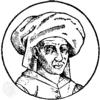- Josquin des Prez
-
1440?-1521; Fr. composer
* * *
born с 1445, Condé-sur-l'Escaut?, Burgundian Hainautdied Aug. 27, 1521, Condé-sur-l'EscautNorthern French composer.Perhaps a student of Johannes Ockeghem, he spent his life working as a singer, moving from post to post in Italy, including the Milan Cathedral (1459–72) and the Papal Chapel (1486–94), before returning to Condé in 1504, where he would spend the rest of his life. Josquin was able to balance complexity of imitative counterpoint with an inexhaustible melodic gift. He left over 60 motets (including Absalon, fili mi), some 18 complete masses (including Missa Pange lingua), and many superb secular songs in the chordal "Italian" style (including "El grillo"). The first music printer, Ottaviano Petrucci, devoted an entire volume to Josquin's works, an honour accorded to no other composer. His posthumous reputation, as attested by Martin Luther and others, was the greatest of any composer up to his time, and his works were closely imitated throughout the 16th century. Josquin des Prez, drawing by Joris van der Straeten, 16th century.The Bettmann Archive
Josquin des Prez, drawing by Joris van der Straeten, 16th century.The Bettmann Archive* * *
▪ French-Flemish composerdes Prez also spelled Desprez, des Prés , or Desprésborn c. 1450, Condé-sur-l'Escaut?, Burgundian Hainaut [France]died Aug 27, 1521, Condé-sur-l'Escautone of the greatest composers of Renaissance Europe.Josquin's early life has been the subject of much scholarly debate, and the first solid evidence of his work comes from a roll of musicians associated with the cathedral in Cambrai in the early 1470s. During the late 1470s and early '80s, he sang for the courts of René I of Anjou and Duke Galeazzo Maria Sforza of Milan, and from 1486 to about 1494 he performed for the papal chapel. Sometime between then and 1499, when he became choirmaster to Duke Ercole I of Ferrara, he apparently had connections with the Chapel Royal of Louis XII of France and with the Cathedral of Cambrai. In Ferrara he wrote, in honour of his employer, the mass Hercules Dux Ferrariae, and his motet Miserere was composed at the duke's request. He seems to have left Ferrara on the death of the duke in 1505 and later became provost of the collegiate church of Notre Dame in Condé.Josquin's compositions fall into the three principal categories of motets, masses, and chansons. Of the 20 masses that survive complete, 17 were printed in his lifetime in three sets (1502, 1505, 1514) by Ottaviano dei Petrucci. His motets and chansons were included in other Petrucci publications, from the Odhecaton (an anthology of popular chansons) of 1501 onward, and in collections of other printers. Musical laments on his death by Nicolas Gombert, Benedictus Appenzeller, and Hieronymus Vinders are extant. Martin Luther expressed great admiration for Josquin's music, calling him “master of the notes, which must do as he wishes; other composers must do as the notes wish.” In his musical techniques he stands at the summit of the Renaissance, blending traditional forms with innovations that later became standard practices. The expressiveness of his music marks a break with the medieval tradition of more abstract music.In his motets (motet), particularly, Josquin gave free reign to his talent, expressing sorrow in poignant harmonies, employing suspension for emphasis, and taking the voices gradually into their lowest registers when the text speaks of death. Josquin used the old cantus firmus style, but he also developed the motet style that characterized the 16th century after him. His motets, as do his masses, show an approach to the modern sense of tonality.In his later works he gradually abandoned cantus firmus technique for parody and paraphrase. He also frequently used the techniques of canon and of melodic imitation.In his chansons (chanson) Josquin was the principal exponent of a style new in the mid-15th century, in which the learned techniques of canon and counterpoint were applied to secular song. He abandoned the fixed forms of the rondeau and the ballade, employing freer forms of his own device. Though a few chansons are set chordally rather than polyphonically, a number of others are skilled examples of counterpoint in five or six voices, maintaining sharp rhythms, straightforwardness, and clarity of texture.Additional ReadingEdward E. Lowinsky (ed.), Josquin des Prez (1976), collects papers from an international conference. Sydney Robinson Charles, Josquin des Prez: A Guide to Research (1983), includes a bibliography and discography.* * *
Universalium. 2010.
